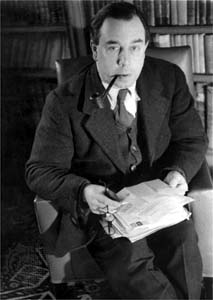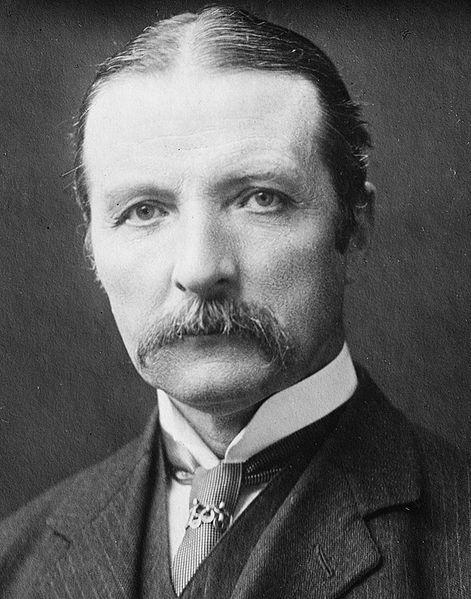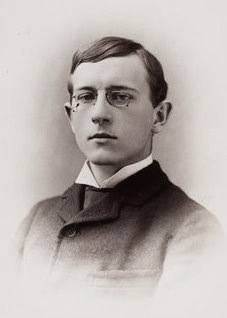<Back to Index>
- Novelist and Playwright John Boynton (J.B.) Priestley, 1894
- Critic William Archer, 1856
- Drama Teacher George Pierce Baker, 1866
PAGE SPONSOR

John Boynton Priestley, OM (13 September 1894 – 14 August 1984), known as J.B. Priestley, was an English novelist, playwright and broadcaster. He published 26 novels, notably The Good Companions (1929), as well as numerous dramas such as An Inspector Calls. His output included literary and social criticism.
Priestley was born at 34 Mannheim Road, Manningham, which he described as an "ultra - respectable" suburb of Bradford. His father was a headmaster. His mother died when he was still an infant and his father remarried four years later. Priestley was educated at Belle Vue Grammar School, which he left at sixteen to work as a junior clerk at Helm & Co., a wool firm in the Swan Arcade. During his years at Helm & Co. (1910 – 1914), he started writing at night and had articles published in local and London newspapers. He was to draw on memories of Bradford in many of the works he wrote after he had moved south, including Bright Day and When We Are Married. As an old man he deplored the destruction by developers of Victorian buildings in Bradford such as the Swan Arcade, where he had his first job.
Priestley served during the First World War in the 10th Battalion, the Duke of Wellington's Regiment. He was wounded in 1916 by mortar fire. In his autobiography, Margin Released he is fiercely critical of the British Army and in particular of the officer class.
After his military service Priestley received a university education at Trinity Hall, Cambridge. By the age of 30 he had established a reputation as a humorous writer and critic. His novel Benighted (1927) was adapted into the James Whale film The Old Dark House (1932); the novel has been published under the film's name in the United States.
Priestley's first major success came with a novel, The Good Companions (1929), which earned him the James Tait Black Memorial Prize for fiction and made him a national figure. His next novel, Angel Pavement (1930), further established him as a successful novelist. However, some critics were less than complimentary about his work, and Priestley began legal action against Graham Greene for what he took to be a defamatory portrait of him in the novel Stamboul Train (1932).
In 1934 he published the travelogue English Journey, which is an account of what he saw and heard while traveling through the country in the autumn of the previous year.
He moved into a new genre and became equally well known as a dramatist. Dangerous Corner was the first of a series of plays that enthralled West End theatre audiences. His best known play is An Inspector Calls (1945), later made into a film starring Alastair Sim released in 1954. His plays are more varied in tone than the novels, several being influenced by J. W. Dunne's theory of time, which plays a part in the plots of Dangerous Corner (1932) and Time and the Conways (1937).
Many of his works have a socialist aspect. For example, An Inspector Calls, as well as being a "Time Play", contains many references to socialism — the inspector was arguably an alter ego through which Priestley could express his views.
During World War II, he was a regular broadcaster on the BBC. The Postscript, broadcast on Sunday night through 1940 and again in 1941, drew peak audiences of 16 million; only Churchill was more popular with listeners. But his talks were cancelled. It was thought that this was the effect of complaints from Churchill that they were too left wing; however, Priestley's son has recently revealed in a talk on the latest book being published about his father's life that it was in fact Churchill's Cabinet that brought about the cancellation by supplying negative reports on the broadcasts to Churchill.
Priestley chaired the 1941 Committee, and in 1942 he was a co-founder of the socialist Common Wealth Party. The political content of his broadcasts and his hopes of a new and different England after the war influenced the politics of the period and helped the Labour Party gain its landslide victory in the 1945 general election. Priestley himself, however, was distrustful of the state and dogma.
Priestley's name was on Orwell's list, a list of people which George Orwell prepared in March 1949 for the Information Research Department, a propaganda unit set up at the Foreign Office by the Labour government. Orwell considered these people to have pro-communist leanings and therefore to be inappropriate to write for the IRD.
He was a founding member of the Campaign for Nuclear Disarmament in 1958.
In 1960, Priestley published Literature and Western Man, a 500 page survey of Western literature in all its genres, including Russia and the United States but excluding Asia, from the second half of the 15th century to the present (the last author discussed is Thomas Wolfe).
Although Priestley never wrote a formal book of memoirs, his literary reminiscences, Margin Released (1962), provide valuable insights into his work. The section dealing with his job as a teenage clerk in a Bradford wool - sorter's office manages to weave fine literature from an outwardly unpromising subject – a characteristic of many of his novels.
His interest in the problem of time led him to publish an extended essay in 1964 under the title of Man and Time (Aldus published this as a companion to Carl Jung's Man and His Symbols). In this book he explored in depth various theories and beliefs about time as well as his own research and unique conclusions, including an analysis of the phenomenon of precognitive dreaming, based in part on a broad sampling of experiences gathered from the British public, who responded enthusiastically to a televised appeal he made while being interviewed in 1963 on the BBC program, Monitor. Priestley managed the treatment of this potentially esoteric subject matter with warmth and competence.
Priestley was one of the interviewees for the documentary series The World at War (1973), in the episode "Alone: May 1940 – May 1941". He declined lesser honors before accepting the Order of Merit in 1977.
The University of Bradford awarded Priestley the title of honorary Doctor of Letters in 1970, and he was awarded the Freedom of the City of Bradford in 1973. His connections with the city were also marked by the naming of the J.B. Priestley Library at the University of Bradford, which he officially opened in 1975, and by the larger - than - life statue of him, commissioned by the Bradford City Council after his death, and which now stands in front of the National Media Museum.
A special collector's edition of Bright Day was re-issued by Great Northern Books in 2006, celebrating the 60th anniversary of the publication of this novel.
Priestley had a deep love of classical music, and in 1941 he played an important part in organizing and supporting a fund raising campaign on behalf of the London Philharmonic Orchestra, which was struggling to establish itself as a self - governing body after the withdrawal of Sir Thomas Beecham. In 1949 the opera The Olympians by Arthur Bliss, to a libretto by Priestley, was premiered.
He
married three times. In 1921 he married Emily "Pat" Tempest, a
music loving Bradford librarian. Two daughters were born in 1923 and
1924, but in 1925 his wife died of cancer. In September 1926, he married Jane Wyndham - Lewis (ex-wife of the original 'Beachcomber' D.B. Wyndham - Lewis, no relation to the artist Wyndham Lewis); they had two daughters and one son. In 1953, he divorced his second wife and married the archaeologist and writer Jacquetta Hawkes, his collaborator on the play Dragon's Mouth.

William Archer (23 September 1856 – 27 December 1924), Scottish critic, was born in Perth, and was educated at the University of Edinburgh, where he received the degree of M.A. in 1876. He was the son of Thomas Archer.
He became a leader - writer on the Edinburgh Evening News in 1875, and after a year in Australia returned to Edinburgh. In 1878 he took up residence in London. In 1879 he became dramatic critic of the London Figaro, and in 1884 of the World, where he remained until 1905. In London he soon took a prominent literary place.
Archer had much to do with introducing Ibsen to the English public by his translation The Pillars of Society, produced at the Gaiety Theatre, London, 1880. He also translated, alone or in collaboration, other productions of the Scandinavian stage: Ibsen's A Doll's House (1889), The Master Builder (1893, with Edmund Gosse); Edvard Brandes's A Visit (1892); Ibsen's Peer Gynt (1892, with Charles Archer); Little Eyolf (1895); and John Gabriel Borkman (1897); and he edited Henrik Ibsen's Prose Dramas vols., (1890 – 1891).
In 1897 Archer, along with Elizabeth Robins, H.W. Massingham, and Alfred Sutro, formed the Provisional Committee to organize an association to produce plays of high literary intrinsic merit, such as Ibsen's. The association was called the "New Century Theatre" but was a disappointment by 1899, although it continued until at least 1904. In 1899, a more successful association, called the Stage Society, was formed to replace it.
Archer was a friend of George Bernard Shaw, and arranged for his plays to be translated into German. An attempted collaboration on a play, Widower's Houses, did not work, however, and Archer was often critical of Shaw's drama. For a time, Archer lived at 27 Fitzroy Square in central London, while Shaw lived at number 29.
During World War I, Archer wrote a series of open letters on behalf of Wellington House, arguing Germany's culpability in starting the conflict. He viewed the Allies (including England) as innocent bystanders, forced into defending the world against German militancy.
His play, The Green Goddess, was produced by Winthrop Ames at the Booth Theatre in New York. It was a melodrama, and a popular success, although relatively of much less importance to the art of the drama than his critical work.
He was one of the founders of the Simplified Spelling Society in 1908.

George Pierce Baker (1866–1935) was an American educator in the field of drama.
Baker graduated in the Harvard University class of 1887, and taught in the English Department at Harvard from 1888 until 1924. He started his "47 workshop" class in playwriting in 1905. He was instrumental in creating the Harvard Theatre Collection at Harvard University Library. In 1908 he began the Harvard Dramatic Club, acting as its sponsor, and in 1912 he founded Workshop 47 to provide a forum for the performance of plays developed within his English 47 class. He was elected a Fellow of the American Academy of Arts and Sciences in 1914. Unable to persuade Harvard to offer a degree in playwrighting, he moved to Yale University in 1925, where he helped found the Yale School of Drama. He remained there until his retirement in 1933.
Baker was also selected to teach a seminar whose unconfirmed title was "Shakespeare" or "the English drama" at the Sorbonne University (Paris, France) in 1908.
Among those he taught in his playwriting class were George Abbott, Philip Barry, S.N. Behrman, Hallie Flanagan, Sidney Howard, Stanley McCandless, Eugene O'Neill, Edward Sheldon, Maurine Dallas Watkins, and Thomas Wolfe. His Dramatic Technique (1919) offered a codification in English of the principles of the well - made play.